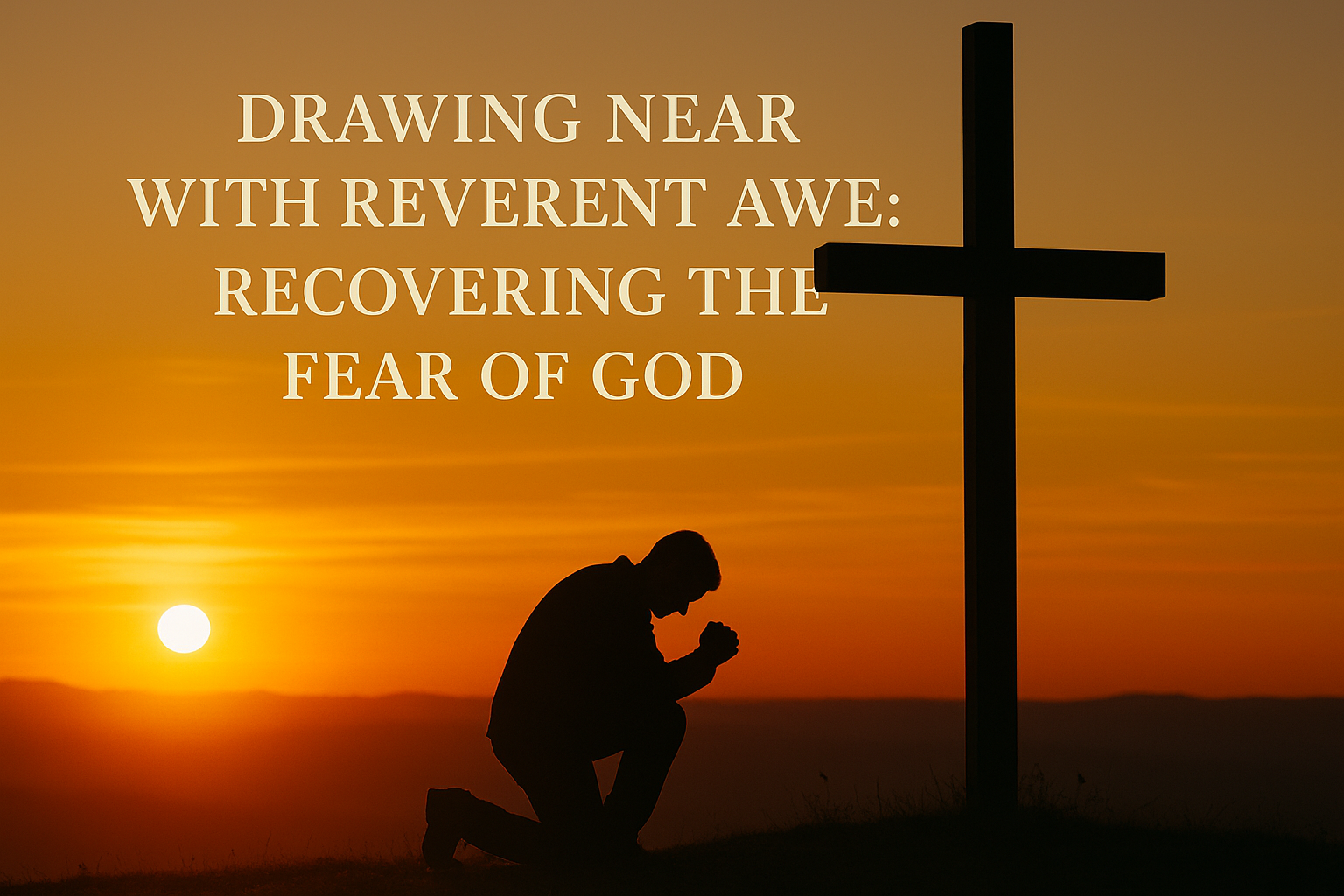⏱️ Estimated Reading Time: 4 min read
Drawing Near with Reverent Awe: Recovering the Fear of God
In today’s culture of casual spirituality, even many professing Christians speak of God with little reverence. But Scripture paints a far different picture — one of trembling joy, holy reverence, and heartfelt awe. The Bible’s call to fear the Lord is not a relic of the Old Testament. It is a central theme of true worship and godly living for every believer.
What Does It Mean to “Fear God” According to the Bible?
The fear of God is not a cringing dread that causes us to flee. It is a holy reverence that draws us near. It is the proper response to who God is: His holiness (Isaiah 6:1–5), His justice (Hebrews 10:30–31), His sovereign authority (Proverbs 21:1), and His steadfast love (Psalm 103:11–13). To fear the Lord is to stand in awe of His greatness, to tremble at His Word, and to bow in joyful submission before His majesty.
In this sense, the fear of God includes both awe and affection. It produces a heart that says, “God is holy, I am not, but by His grace I belong to Him. So I revere, love, and obey Him.”
Not Terror, But Filial Reverence
Is the fear of God the same as being afraid of Him? Not in the way the world fears punishment. Scripture distinguishes between servile fear, a dread rooted in guilt or punishment, and filial fear, a childlike reverence that flows from love. For the believer, the fear of the Lord is not about shrinking back in anxiety. It is about leaning in with humility and obedience.
As Hebrews 12:28–29 exhorts us, “Let us offer to God acceptable worship, with reverence and awe, for our God is a consuming fire.”
Why the Fear of the Lord Is Essential
The fear of God is not optional or peripheral. It is foundational to the Christian life. Proverbs 1:7 declares, “The fear of the Lord is the beginning of knowledge,” and Ecclesiastes 12:13 summarizes our whole duty this way: “Fear God and keep his commandments.”
Rightly fearing the Lord leads to:
- Wisdom (Proverbs 9:10)
- Holiness (2 Corinthians 7:1)
- Obedience (Deuteronomy 10:12)
- Spiritual maturity (Philippians 2:12–13)
- Worship that honors God (Psalm 2:11)
Far from contradicting love, the fear of the Lord deepens it. We cannot love God rightly if we do not revere Him deeply.
What Happens When the Fear of God Is Lost?
The consequences of losing the fear of God are tragic, both for individuals and churches. When reverence is abandoned, truth is compromised. Scripture warns of this drift:
“There is no fear of God before their eyes.” —Romans 3:18
Without the fear of the Lord:
- Sin is tolerated or redefined
- God is treated casually
- Scripture is twisted or neglected
- Entertainment replaces worship
- Theological liberalism and cultural compromise take root
The absence of fear opens the door to false teaching, shallow faith, and spiritual ruin.
How Can We Grow in the Fear of God?
Reverent awe does not develop passively. It must be cultivated. Here are several ways to grow in godly fear:
- Study the character of God in Scripture, especially His holiness and justice
- Meditate on His attributes and promises
- Confess and turn from sin regularly
- Worship with reverence and joy
- Remain in community that exalts Christ and trembles at His Word (Isaiah 66:2)
Conclusion: Awe That Draws Us Near
The fear of the Lord is not about running from God. It is about bowing low before Him. It is the humble posture of a forgiven sinner standing in awe before a holy, loving King. In a world that trivializes truth and treats God lightly, may we rediscover the joy and wisdom of fearing the Lord.
“The fear of the Lord is clean, enduring forever.” —Psalm 19:9
📚 Recommended Resources for Further Study:
- The Holiness of God – R.C. Sproul
- The Joy of Fearing God – Jerry Bridges
- Holiness – J.C. Ryle
- Contending for the Word Q&A at Servants of Grace.
- Contending for the Word at YouTube.
Dave Jenkins is happily married to his wife, Sarah. He is a writer, editor, and speaker living in beautiful Southern Oregon. Dave is a lover of Christ, His people, the Church, and sound theology. He serves as the Executive Director of Servants of Grace Ministries, the Executive Editor of Theology for Life Magazine, the Host and Producer of Equipping You in Grace Podcast, and is a contributor to and producer of Contending for the Word. He is the author of The Word Explored: The Problem of Biblical Illiteracy and What To Do About It (House to House, 2021), The Word Matters: Defending Biblical Authority Against the Spirit of the Age (G3 Press, 2022), and Contentment: The Journey of a Lifetime (Theology for Life, 2024). You can find him on Facebook, Twitter, Instagram, Youtube, or read his newsletter. Dave loves to spend time with his wife, going to movies, eating at a nice restaurant, or going out for a round of golf with a good friend. He is also a voracious reader, in particular of Reformed theology, and the Puritans. You will often find him when he’s not busy with ministry reading a pile of the latest books from a wide variety of Christian publishers. Dave received his M.A.R. and M.Div through Liberty Baptist Theological Seminary.




